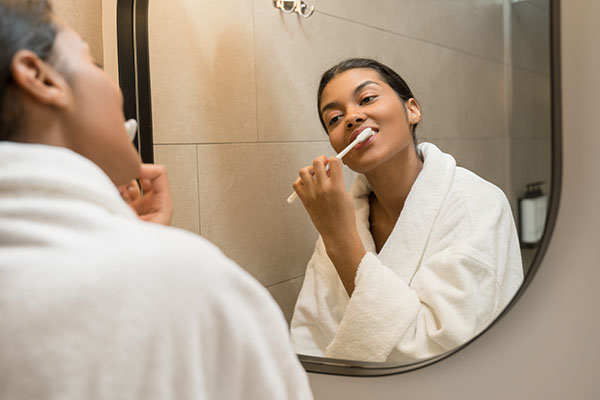 Consistent oral hygiene is essential for promoting strong oral health. While responsibly caring for your mouth deserves attention throughout the day, oral hygiene basics before sleep is essential in keeping your teeth and gums healthy over time.
Consistent oral hygiene is essential for promoting strong oral health. While responsibly caring for your mouth deserves attention throughout the day, oral hygiene basics before sleep is essential in keeping your teeth and gums healthy over time.
How to take care of your teeth before bed
Regularly practicing strong oral hygiene habits before bed can make a world of difference in the health of your mouth, over both the short and long term. Aside from promoting consistency in oral hygiene practices, brushing before bed is essential because the mouth tends to dry out while you sleep. This allows bacteria to more easily proliferate, which will harden into plaque on teeth. Brushing your teeth before sleeping can help to control this process.
Here are some things you should work to do every night to develop routines and ensure they stay consistent.
Brush and floss your teeth before going to sleep
This is one of the earliest aspects of oral hygiene basics that children learn, and for good reason: Consistently brushing and flossing before bed is one of the most effective ways to regularly practice good oral hygiene.
Brushing and flossing right before bed will ensure that no food is left in your mouth before going to sleep. This is especially true of flossing, which lets you reach difficult-to-find pieces of food that may be stuck between teeth, particularly in the back of your mouth.
Brushing your teeth with fluoride toothpaste for at least two minutes is a good rule of thumb. Using an electric toothbrush can be an added bonus in effectively managing oral health.
Use a mouth rinse before bed
For an added boost to oral health, consider using a mouthwash or rinse before bed. A rinse will help to remove bacteria from your mouth and can effectively help prevent cavities. It can also help remove food from hard-to-reach parts of your mouth, as well as work to provide fluoride treatment to those same difficult-to-reach areas.
Wear a mouthguard while you sleep
A night guard can be an extremely effective sleep aid in promoting strong oral health. Mouthguards protect against grinding and clenching teeth during sleep, which can lead to chipped or sensitive teeth, as well as a sore jaw or a jaw with limited mobility.
Generally, mouth guards are custom-made by a dentist and can be extremely valuable in ensuring that your teeth and jaw do not become damaged overnight.
Don’t eat late at night
Avoiding late-night snacks — particularly after brushing, flossing, and rinsing — will ensure your mouth stays clean before bed, also helping to prevent bacteria from proliferating in your mouth overnight.
Conclusion
Overall, sound oral hygiene basics before bed can make a major difference in the long-term health of your mouth. Employing these practices beginning at a young age can help to make these routines lifelong, protecting your mouth's health over time and helping you avoid unnecessary dental work. In short, a few minutes of attention every night will help ensure strong oral hygiene during the day.
Request an appointment or call Gledhill Dental at 509-800-8410 for an appointment in our Kennewick office.
Related Posts
Implant supported dentures combine traditional dentures with permanent dental implants to provide a stable and secure tooth restoration option. Unlike traditional removable dentures, this option is supported by two or more dental implants rather than your gum tissues. The additional stability of dental implants may make it simpler to bite and chew meals, particularly with…
Having a solid handle on good oral hygiene basics will help preserve the integrity of your teeth and mouth health for a long time to come. Steering clear of cavities, receding gums, or decay ensures that your smile is bright and beautiful for as long as possible. If you think you already have an excellent…
Having a firm understanding of oral hygiene basics can prevent tooth decay, gum disease, and general oral discomfort. Human beings go through life developing a range of habits that impact oral health, some of which are good and some of which are bad. Avoiding these damaging behaviors promotes strong teeth and gums that can last…


